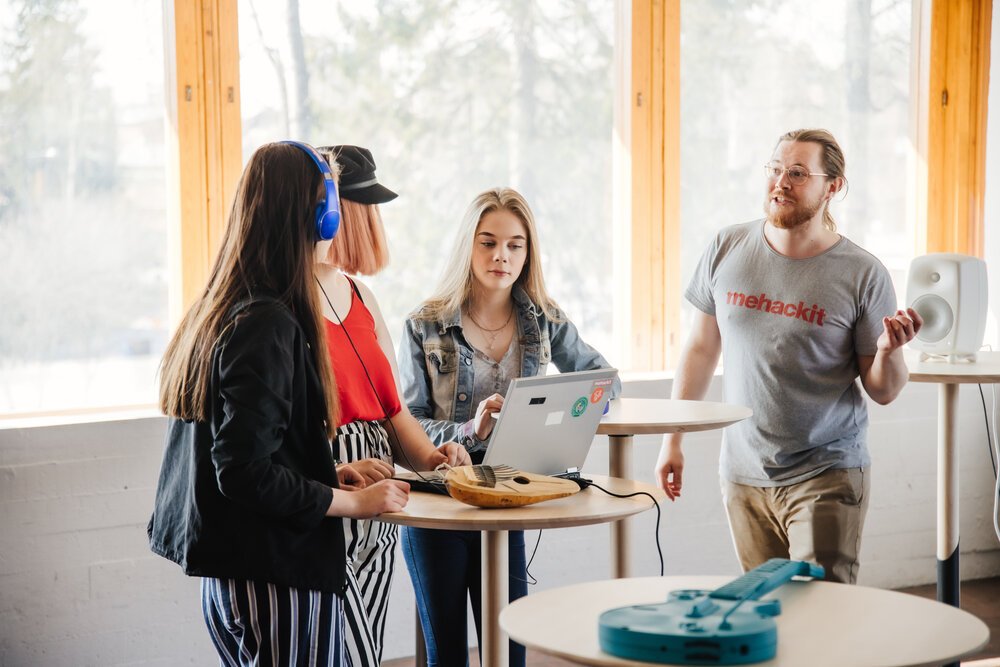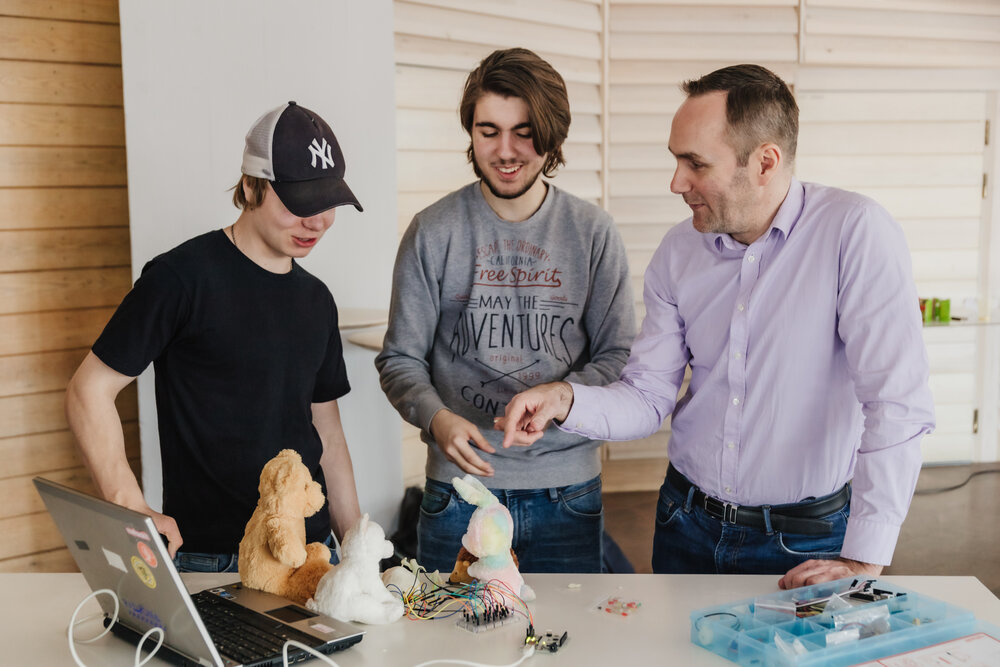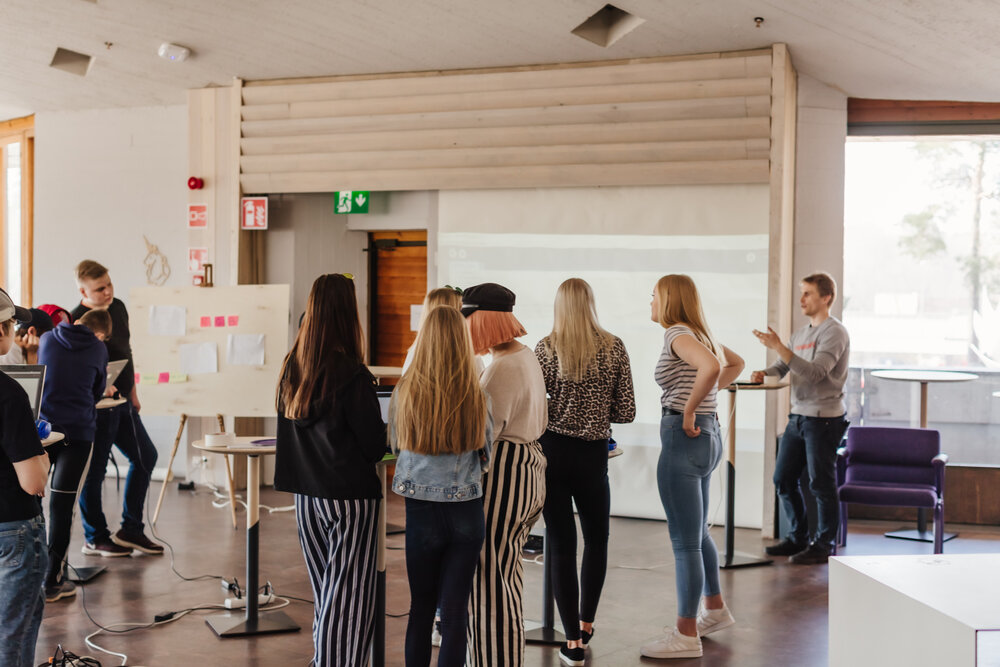Why to connect programming education with something meaningful: Part 2
You can read the previous post in this series here.
One central idea of the maker movement is that we shouldn’t learn technology only for the sake of technology but to make something with it. Whatever you make, it can be described as a project and that’s why Project Based Learning (PBL) is so closely connected to maker culture. In this post we are going to talk about the meaning, criteria and benefits of successful project based programming education.

Benefits of making projects
Project Based Learning isn’t a unified learning paradigm but rather a variety of different ideas and practices framed around the concept of making projects in education. It’s often contrasted to a view where learning is very theory-oriented and knowledge is presented as abstract rules without a hands-on context.
Some studies have compared a project-based learning group and more traditional one and learned that students in the PBL-group remember the content longer and have a deeper understanding of it (1). On the other hand it has been emphasized that project based learning requires new things from the students and from the teacher. It’s kind of risky business: If the project is successful, the benefits are great but e.g. lack of project management skills can lead to poorer outcomes as well. (2)
But the only benefit of project based learning isn’t remembering and understanding things better. If you build a weather station, it’s not just about learning about physics and programming through the project. You also learn to search information, collaborate and to deal flexibly with the surprises and setbacks. Learning of these kind of meta-skills is often missing from more traditional schoolwork.

What is is high Quality Project Based Learning?
Buck Institute of Education, a non-profit organization based in California, has developed a freely available and research based framework for High Quality Project Based Learning (HQPBL). Below are the six criteria they suggest. I give examples of how our learning service takes these points into account.
Intellectual Challenge and Accomplishment: “Do students investigate challenging problems, questions, and issues over an extended period of time? Do they focus on concepts, knowledge, and skills central to subject areas and intellectual disciplines?”
Coding is something new to most of our students. Students practice the programming concepts in tasks and creative exercises. Guided by our online-materials, students work individually or in pairs. This way students can proceed at their own pace and spend more time with the parts they find most challenging.
Authenticity: “Do the students engage in work that makes an impact on or otherwise connects to the world beyond school, and to their personal interests and concerns? Do they use the tools, techniques, and/or digital technologies employed in the world beyond school?
If the aim is to connect projects with students’ personal interests, it’s tempting to simply let the students “do what they want”. Nevertheless, if anything is possible, it’s hard to start making – especially if the programming concepts still feel a bit challenging. Creativity needs some kind of boundaries like examples of possible end-results and a recommended time-limit for completing the project. This kind of scaffolding supports project-work in Mehackit Atelier.
Public product: “Do the students share their work-in-progress with peers, teachers, and others for feedback? Do they exhibit their work and describe their learning to peers and people beyond the classroom?”
For example on our Music Programming track, we have a tradition of organizing an ending concert where students get to present their songs and give feedback to each other. Students return their results to our learning platform where it’s easy to give feedback and make peer assessment as well.

Collaboration: “Do the students work in teams to complete complex tasks? Do the students learn to become effective team members and leaders?”
For example on our Electronics and Programming track, we encourage working in pairs or groups of three. This teaches students group working skills and makes it possible to divide work based on student’s strengths and interests.
Project Management: “Do the students manage themselves and their teams efficiently and effectively throughout a multistep project? Do the students learn to use project management processes, tools, and strategies?”
Handling the creative freedom requires some project management skills, but the good thing is that these skills can be learned! In Mehackit Atelier, the first projects are short and guided. As the projects get more advanced, there’s more creative freedom included.
Reflection: “Do the students learn to assess and suggest improvements in their own and other students’ work? Do they reflect on, write about, and discuss the academic content, concepts, and success skills they are learning?”
In the teacher materials of Mehackit Atelier we encourage the teacher to have this kind of facilitating discussions with the students during the projects. At first it can mean just asking a couple of questions at the right situations. Why do you want to do this project? If the thing you planned doesn’t work, can you make a simpler version of this for the deadline?
In programming education, project based learning can help to connect the abstract concepts to meaningful and personal results. Besides learning about the programming concepts, there’s potential for learning to manage projects, collaborate with other students and reflect critically on one’s own learning process.
References and resources
Penuel, W. R., & Means, B. (2000). Designing a performance assessment to measure students’ communication skills in multi-media-supported, project-based learning. Paper presented at the Annual Meeting of the American Educational Research Association, New Orleans.
Thomas, J. W. 2000. Review on research of project based learning. San Rafael, CA: Autodesk Foundation.
Buck Institute for Education: High Quality Project Based learning
https://hqpbl.org/
Buck Institute for Education: PBL Works
https://www.pblworks.org/